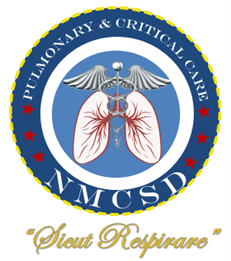- Rotation Director: Russell J Miller, M.D.
- Rotation Location: Elective Dependent
- Rotation Duration: One to Six 4-week blocks
- Trainees/month: One or More
Education Purpose and Rotation Description:
- During the fellowship program at NMCSD, six months are specifically allocated for fellows to explore their interests within the fields of Pulmonary and Critical Care Medicine. The flexibility this provides is a key strength of our program and allows the creation of rotations designed to meet diverse learning goals.
- While the term “elective” denotes choice, there are preferred electives that, although not mandatory, are offered when availability allows. These electives are usually conducted at our affiliated training sites and are assigned to individual fellows based on availability. Thus, it’s recommended that fellows discuss their preferences for these electives with the program director. If no preferences are specified, elective rotations will be assigned in due course.
- Former fellows have successfully utilized the dedicated elective time to achieve a range of personal and professional objectives. These include acquiring advanced procedural skills, gaining additional Critical Care experience, focusing efforts on research, completing in-depth military rotations such as spending a month on board the USNS Mercy for deployment on humanitarian missions or at Scripps Green for an extended surgical critical care experience and obtaining further exposure to Interstitial Lung Diseases. This is not an exhaustive list, and it provides a glimpse into the diverse opportunities available. Fellows have the freedom to choose, either distributing their elective time across several areas or dedicating the entirety of this duration to a single area of study as per their interests and career objectives.
- Specific requirements to be fulfilled during the electives include the necessity for fellows to return to NMCSD for outpatient clinics at least half a day per week. Additionally, fellows are required to prepare in advance a set of carefully designed competency-based educational objectives for the elective rotation. These objectives should follow the same format as the one used for other rotations referenced in the handbook.
- As part of these objectives, a valid method of evaluating the success of the rotation must be established. Importantly, an adept and qualified mentor needs to be assigned to oversee these elective rotations, providing the necessary guidance and supervision.
